Artist: Daryl Hall & John Oates
Album: Live in Dublin
Label: Eagle Rock
Release Date: 03/31/2015
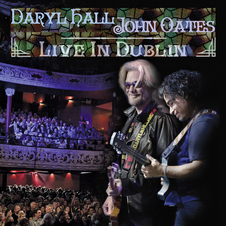
[I]t’s like a scene from The Commitments. A beloved pair of Philly natives who have enthralled U.S. audiences for decades head overseas to Ireland to give fans they hadn’t yet played for as a duo a one-of-a-kind soul music experience. Fortunately for one audience in Dublin, the music they hear from Hall & Oates covers the worlds of sweet pop and rock quite nicely as well.
How one of music’s most successful duos managed to leave Ireland off their touring itinerary for more than 40 years is astounding. In fact, it’s a “why?” question the duo ask themselves frequently throughout this two-CD/DVD combo. Though they don’t have a straight answer, and one thing’s for sure: this won’t be the last time Hall & Oates take the Olympia Theatre by storm, but it’ll be the last time they take it for granted.
The brotherly soul that still exists between both Hall and Oates is palpable. With his leather jacket and flowing blond mane, Hall exudes every bit the confident frontman, as Oates smiles behind his guitars and interjects the perfect level of harmony on each tune. The duo keeps their set to a relatively tight 100 minutes, but fortunately, it’s chock full of their most popular songs.
From the slinky “Maneater” to the more upbeat “Out of Touch” to the not as common mega-hit “Say It Isn’t So,” Hall gives this set his passionate all despite masking his eyes behind shades for the show’s duration. Oates, meanwhile, plugs away at his electric guitar and provides a dynamic complement to his bandmate’s swagger.
This is a performance worthy of the duo’s Gamble and Huff era, especially when the pair goes into an extended version of “I Can’t Go For That (No Can Do),” which is filled here with call-and-response between duo and band and a mighty wail of a sax solo. “Do What You Want, Be What You Are” proves another pleasant surprise, while “Family Man” gets slowed down to something more sensual than controversial.
To coincide with the album’s release, Elmore took time to chat with John Oates from his home base of Nashville about a variety of topics, including Hall & Oates’ Irish fan base, his solo work and his new life as a Rock and Roll Hall of Fame inductee.
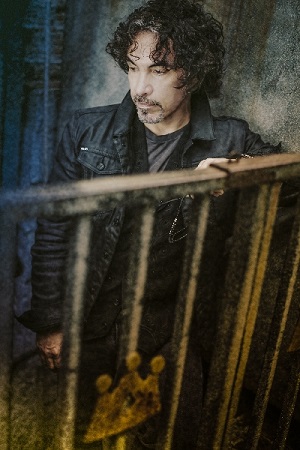
Elmore: As Hall & Oates, you guys tend to be quite varied with your live album releases; one included members of the Temptations. Why focus on Dublin for this album?
John Oates: We had a UK tour planned, and when the UK dates became available, we saw that there was a Dublin date available at the Olympia Theatre. As crazy as it seems, Daryl and I have both played in Ireland as solo artists but neither of us have ever played [in Ireland] together. We knew that Irish people in general are just music lovers. The Olympia Theatre has an incredibly prestigious and amazing history… and we thought the combination of an audience who has never seen us play together in Ireland at this great venue just had to be something that we should document. So we decided to film it. And we were right; I’m glad we did.
I think it was important for us to document this band at this exact time. We have been blessed and fortunate to have amazing backup musicians who have really become more than backup musicians. Over the years, our bands have been integral to the music that we made. Sure, we wrote the songs, we’re singing them, but those bands were so important over the years and I’m talking about going back to the ’70s, to the records that we made. That being said, the new band is very, very good—one of the best I think we’ve ever had. And I’m not just saying it because it’s the current band. The musicianship, especially in the vocals, is without a doubt the best band we’ve ever had. These guys are incredible. I think the cohesiveness, the vibe, the friendliness, the way everybody gets along—all the things that are so important to making a band very powerful—are in this particular unit. We wanted to capture that.
EM: How did the energy of this Dublin crowd compare to the others that you’ve encountered worldwide over the years?
JO: We’ve been very fortunate. We’ve been on tour so long that we’ve had a lot of amazing nights, you know, and a lot of very incredible moments. But this crowd was on fire and they were really ready to go. I mean they basically sang along to every song—very kind of European style, and the Irish love to sing anyway—and they were well lubricated. A good combination for a good show.
EM: One line of yours in the show that stood out was when you said Hall & Oates was not a “stadiums and smoke bombs” kind of band. You guys easily had the capacity to be that kind of group. Was that something you had both ever dreamed of or wanted?
JO: We were. In the ’80s, we were at that level. We played the multiple nights at Madison Square Garden and we played Live Aid [to] 100,000 people. We played lots of huge stadium shows throughout the ’80s. It’s the “smoke bomb” comment that leads to what I’m about to say: the smoke bombs are really just a metaphor for the idea that we’re not interested in the big production and flashy, blow-you-away with pyrotechnics style of performance. We’re all about music. We’re a band. We sing, we play, we write songs. That’s who we are and we know we’re at our best when we stick to who we are, and that’s what it’s all about. So we purposely choose venues now that are musical, that we feel our audience will enjoy coming to, and where we can communicate our music in the best possible way. Stadiums are not the best way for us to communicate what we do.

EM: You’ve just released your fifth solo album, Good Road to Follow, which has a more modern sound and style. Can you describe how the reception has been to this work?
JO: It’s been overwhelmingly positive. It’s been incredible. It’s obviously the best solo effort I’ve ever had in terms of critical response and also from the fans. I don’t know if you’re aware of it or not, but just a few days ago, I released a DVD and twin-disc set of something called Another Good Road, which is my live show out on Palladia. It’s a live thing I recorded in a studio in Nashville with a bunch of friends and a lot of people who played on the album. I think that was a way for me to extend the music of Good Road to Follow. I hope that’s not too convoluted, but I knew I wasn’t going to really tour behind the album Good Road to Follow and I wanted to play something live because I had been playing the songs live here and there. So I put this live DVD together, and it’s come out unbelievable and the reception to the new DVD is even stronger than the original Good Road to Follow. I think playing these songs live has really made them come to life, and because I’ve had the chance to live with them for a year, the arrangements have evolved. So to me, this Another Good Road project has really kind of taken it to another level.
In terms of Good Road to Follow, it’s my theme, it’s my ongoing theme. It’s a musical road that doesn’t have an end. It ends when I end basically. You know, there’s going to be detours and puddles and some straightaways hopefully with no speed limits and everything in between, and that’s what it’s about.
The DVD was a chance for me to really reveal a little bit more about my personality and my roots and my influences that go beyond way before I met Daryl. Another Good Road and Good Road to Follow are a chance for me to tap into the music that made me want to be a musician, that made me want to learn to play guitar and sing and perform. It’s the music from my childhood all the way up to the time I was 18 and I met Daryl and we created that sound for ourselves. But prior to that, I was playing guitar for 14 years. I played folk music and blues and bluegrass and all sorts of things, and really my true, honest influences are there. And I think on Another Good Road, I get a chance to show that.
EM: You obviously have these projects, and it seems Daryl always has his own projects going, including Live from Daryl’s House. Can we expect any new music from Hall & Oates anytime soon?
JO: I don’t think so. I never say never to anything, but my gut feeling is that we have so much music that we created together over the years that we can’t even play [all] the music we have, much less make new music. Our new creative passions lie in our individual projects, so I think it will remain that way. But at the same time, we enjoy playing together, and we enjoy playing live together and Hall & Oates has an incredible live band. So when you put those factors together, I think what Daryl and I would rather do is resurrect and reimagine and bring back to light some of the really interesting music we’ve made on our deep tracks and our albums cuts over the years. You know, we have this incredibly good problem: we have too many hits. I’m not trying to be boastful in what I say, it’s just the reality. When we play live, we kind of have a professional responsibility to play hits. People want to hear those records and we’re proud of those, but at the same time, we have all this other amazing music just waiting in the wings. Some of it we’ve actually never played. That’s such a crazy idea that we can’t even play the music we have. I think the future of Hall & Oates, in terms of music, is in its past, meaning we can tap our past to create something new for Daryl and I together. That’s really more of what we’re interested in.
EM: One of the defining characteristics of Hall & Oates is your Philadelphia roots/sound. Do you identify as much with the Philly soul sound now as you did back during the Abandoned Luncheonette era?
JO: I don’t know what the Philly soul sound is right now, to be honest with you. The closest thing to Philly soul that I’m aware of is Amos Lee. I don’t know if he qualifies, but he’s amazing. Gamble and Huff are Gamble and Huff. I’m sure they’re still probably making a few records
here and there, but honestly the golden age for me was Cameo-Parkway [Records] in the ’60s and then of course Gamble and Huff in the ’60s into the ’70s. To me, that was the golden age of Philadelphia soul, and yeah, we had a chance to be part of that. We were part of it growing up, but we had other musical paths that we wanted to explore, and so we moved to New York. You can hear it in our music, the sound of Philadelphia, but we’re not limited to it.
EM: What does it mean to you to be a member of the Rock and Roll Hall of Fame?
JO: It seems to mean a lot more to other people than it means to me. Everyone was very impressed, needless to say. Everyone mentions it, everyone talks about it, but to be honest with you, it felt like we were overlooked for so many years—I mean we were eligible since the ’90s—we were overlooked for so many years that it didn’t matter anymore to us. Our lives continued and we continued to be creative, so it wasn’t going to change my life, but at the same time, public perception has certainly changed since we were elected. So to make a long story short, it was a positive experience and it was great to be in that elite group of people; at the same time, it’s a very subjective decision-making process, and I don’t know to how accurately it truly represents the scope of popular music. It’s an odd thing really. I’m ambivalent about it. To be honest with you, I was much more honored personally to be inducted into the American Songwriters Hall of Fame back in 2005; to be considered alongside the giants in American songwriting going back to Cole Porter and Gershwin and then on up through the decades and the Brill Building and all that. To me, that’s the true legacy of music, and really, if you distill the whole thing and you want to get to the essence of it: without the songs that we wrote, we wouldn’t be in the Rock and Roll Hall of Fame. So the Songwriters Hall of Fame, to me, has much more profound meaning.
– Ira Kantor
For Daryl Hall and John Oates’ upcoming tour dates, click here


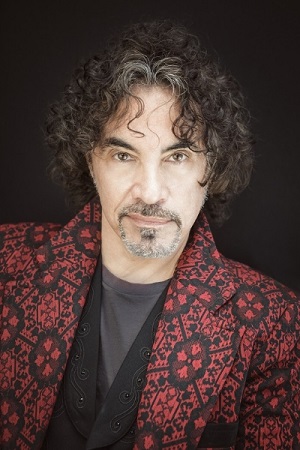
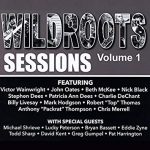
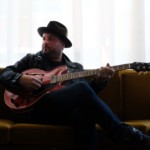
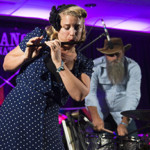
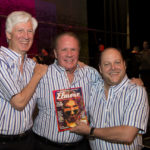

Be the first to comment!